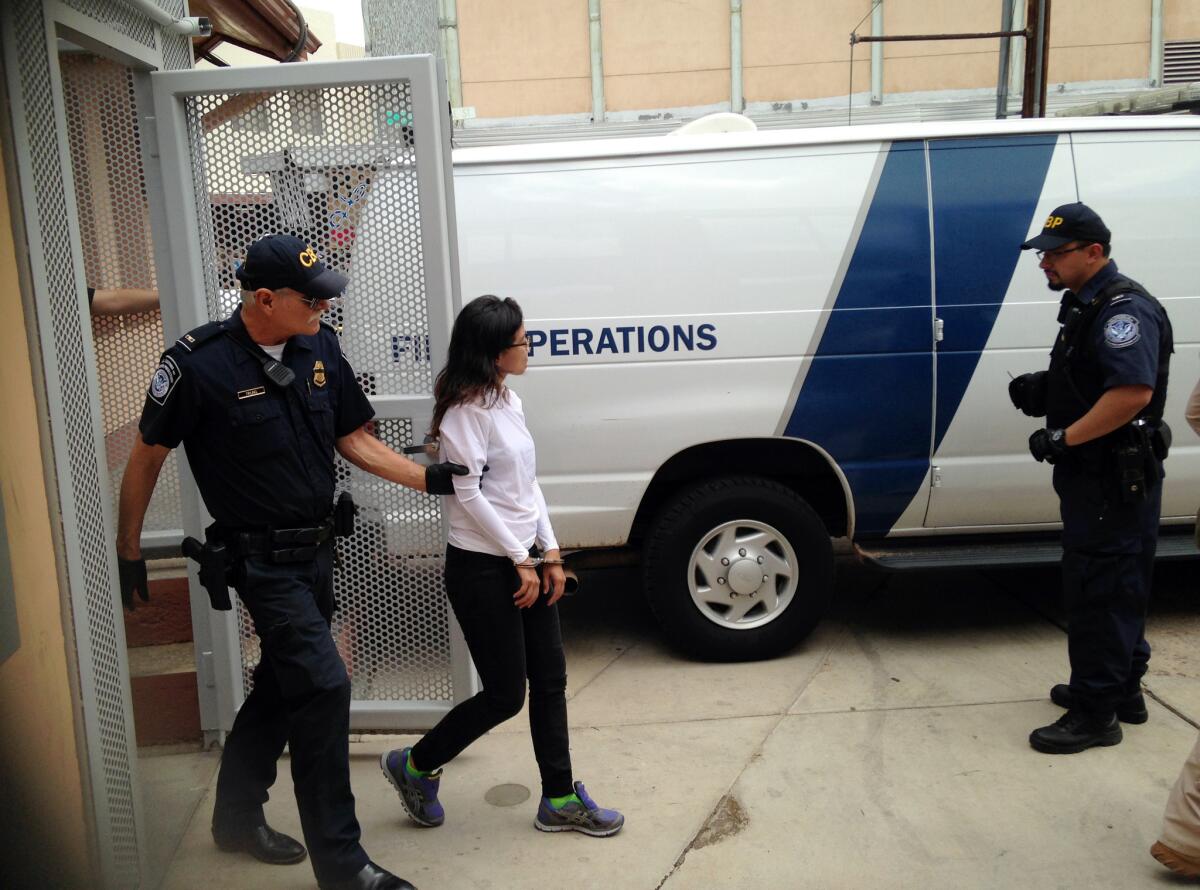Future of ‘Dream 9’ activists who self-deported is still uncertain

- Share via
It’s unclear how long Lulu Martinez will be held in immigration detention -- or if she’ll be deported.
Still, the 23-year-old college student, brought to the United States illegally as a child, says that she and eight others who staged an unusual and brazen protest at the Nogales port of entry in Arizona are hanging on.
“Overall, we are all doing okay giving our very best,” according to a post on Martinez’s Facebook page. “I am so incredibly grateful for all the support and for all those who are coming together to bring us home.”
Martinez, an Illinois resident who was brought into the United States illegally at age 3, voluntarily flew back across the border recently in a protest aimed at showcasing the thousands of people deported from the U.S. under the Obama administration.
Two other young adults also brought into the U.S. illegally -- Marco Saavedra, 23, of New York and Lizbeth Mateo, 29, of Los Angeles -- also crossed into Mexico to prepare for the protest.
On Monday the three protesters demanded to be legally admitted into the U.S. at a border crossing in Nogales.
Martinez was brought into United States when she was 3, as was Saavedra. Mateo made a desert crossing on foot with her mother when she was 10.
As part of the protest, the three were joined by six other people who were brought to this country illegally as children and spent most of their lives in the U.S. but had returned to Mexico more than a year ago, most of them for personal reasons.
The nine — now known as the “Dream 9” — were part of an event orchestrated by the National Immigrant Youth Alliance. The name comes from the Dream Act, which would provide a path to legalization for young immigrants brought into the country illegally.
They armed themselves with an attorney and legal documents. The first stack of papers consisted petitions for humanitarian parole, which would allow them into the country. The second set consisted of petitions for asylum.
U.S. immigration officials detained and questioned them, ultimately denying them humanitarian parole, according to activists in contact with the group’s attorney.
That’s when they entered their petitions for asylum and were transferred to a federal holding facility in Florence, about 60 miles southwest of Phoenix, activists said.
When they had approached the border crossing Monday morning, the nine wore mortar boards and graduation gowns. Later, they were seen in street clothes and handcuffs, being led to a government van.
Initially, organizers gave reports that 30 other young people had spontaneously joined the petitioners. On Tuesday, they said they were mistaken and that just four others had suddenly presented themselves at the border to U.S. officials. Their status was not known.
Immigration and Customs Enforcement officials refused to comment on individual cases. The federal agency, in a prepared statement, would only say: “Under the Immigration and Nationality Act, arriving individuals who are placed in expedited removal proceedings are subject to mandatory detention while their cases are reviewed.”
According to immigration law, a person who files a petition for asylum can be detained until they are interviewed by United States Citizenship and Immigration Services officials. The agency could give each a notice to appear at an immigration hearing at a later time. After that, the nine could either be held in detention until their court date or be let out on parole until that time. Ultimately, they could also be deported.
On Tuesday morning, agents transferred the nine about 30 miles southwest to the Eloy Detention Center, where they dressed in green jumpsuits, underwent medical examinations, munched on bologna sandwiches and cornbread and visited with Mexican consulate officials, according to Martinez’s Facebook page.
Although Martinez does not have access to the Internet, she called her friends, who wrote up the Facebook status on her behalf.
This week’s border action highlights the plight of youth who are in the country illegally. Many have grown up in the U.S., have attended U.S. schools — Martinez attends the University of Illinois in Chicago — and many say they feel American in every way, except for their lack of legal status.
Martinez, Mateo and Saavedra have participated in acts of civil disobedience in the past. Immigration authorities offered Saavedra and Mateo the chance to apply for the Obama administration’s deferred deportation program, which allows immigrants who were brought into the country illegally as children to stay in the U.S., at least for two years.
Both declined, saying they wanted their cases adjudicated — a way of putting a spotlight on the nation’s immigration system.
ALSO:
Natural gas rig blows out, is on fire off Louisiana coast
Las Vegas police officer who died rescuing hiker is remembered
Landing gear punched into Southwest 373 jet on landing, NTSB says
Twitter: @thecindycarcamo
More to Read
Sign up for Essential California
The most important California stories and recommendations in your inbox every morning.
You may occasionally receive promotional content from the Los Angeles Times.











